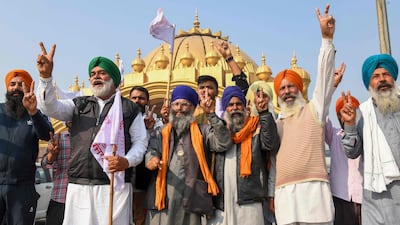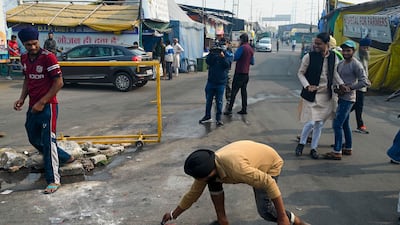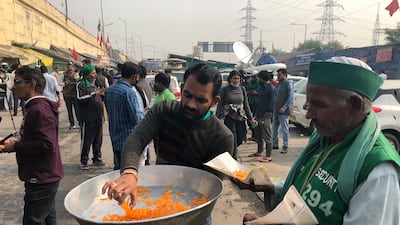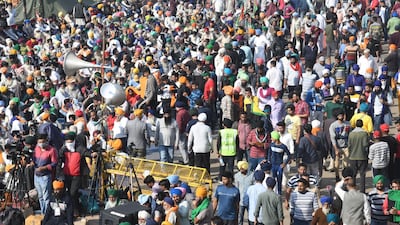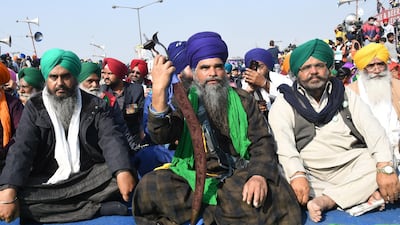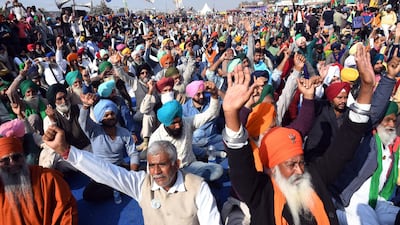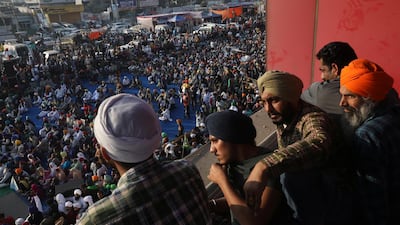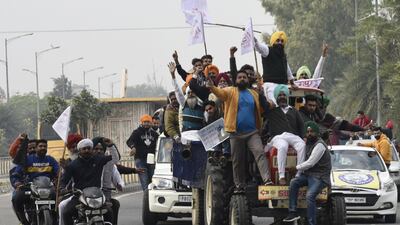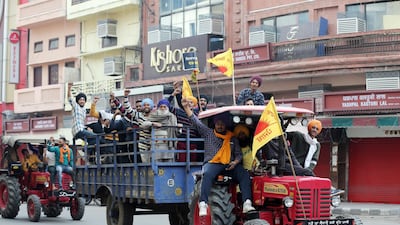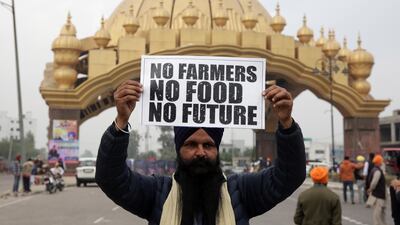Indian Prime Minister Narendra Modi said on Friday he has decided to repeal three controversial agriculture laws against which farmers have protested for more than a year.
“Today I have come to tell you, the whole country, that we have decided to withdraw all three agricultural laws,” Mr Modi said in an address to the nation.
“In the Parliament session starting later this month, we will complete the constitutional process to repeal these three agricultural laws.”
"I appeal to all the farmers who are part of the protest to now return to your home, to your loved ones, to your farms and family. Let's make a fresh start and move forward."
The announcement sparked celebrations among farmers, who said they would wait for the government to follow through on Mr Modi's announcement before calling off their protests.
The agriculture laws passed in September last year allowed farmers to sell produce to buyers out with government-regulated wholesale markets, where growers are assured of a minimum price.
Mr Modi's government has defended the laws, saying they were necessary to modernise the agriculture sector and would boost production through private investment. But the farmers said the laws would affect their earnings by ending guaranteed pricing and force them to sell their crops to corporations at cheaper prices.
The decision to scrap the laws comes before local elections in key states where farmers are an influential voting bloc.
Arati Jerath, a political analyst in Delhi, said it was a rare policy reversal by Mr Modi, who began a second consecutive five-year term as prime minister in 2019 after his Bharatiya Janata Party won parliamentary elections in a landslide.
"It is unprecedented because Modi never takes back a decision. The link to the coming polls is so obvious that I don't think you can give him any brownie points. It won't pass as if he has done something for the welfare of the farmers or has actually listened to their problems and tried to make amendments to something he did to hurt them," Ms Jerath told The National.
She said the decision could boost the BJP's prospects in state legislative elections Punjab and Uttar Pradesh, which will go to the polls in February or March.
"There is a strong possibility that Akali Dal will come back to the BJP, and BJP, Akali Dal and Amarinder Singh put up a fight as a three-part alliance against Congress" in Punjab, she said, referring to the BJP's former alliance partner and the former head of the state government led by Congress, India's main opposition party.
"And in Uttar Pradesh, this was playing up very badly for the BJP because farmers have taken a vow to defeat the BJP in next year's election. The state is their actual stronghold so they had to do something to placate the farmers."
However, the repeal of the legislation might prove to be too little, too late and might also damage Mr Modi's image as a strong leader, Ms Jerath said.
"This has certainly taken off some of the sheen from Modi's charisma because the fact that he has repealed it after one year of turmoil on Delhi's border, so much violence, so many unnecessary deaths and the kind of toll it has taken on the economy, I think it is bad for his image. He has done it from a position of weakness rather than from a position of strength," she said.
Many farmers voiced their delight. "We are thrilled. I feel our struggle and sacrifices of those who died during the protest, has paid off," said Sandeep Sindhu, 27, a farmer from Punjab's Mohali district who has been taking part in a protest near New Delhi since last November.
"But we don't believe this government because they can go to any extreme for elections. We will go to the Parliament for our planned rally on November 29 if the government doesn't repeal it before that," he told The National.
Tens of thousands of farmers have been camped outside the capital after being stopped from entering during violent clashes with police last November. The protests became a lightning rod for opposition to Mr Modi's government in a country where two thirds of the 1.3 billion population rely on agriculture for their livelihood.
The size of the camps waned in recent months but large demonstrations were expected for the first anniversary of the start of the rallies later this month.
The protests took a violent turn in January when a tractor rally in Delhi on India's Republic Day developed into a rampage that left one farmer dead and hundreds of police officers wounded. Last month, eight people died in clashes in Uttar Pradesh.
Mr Singh, former chief minister of Punjab state – home to many of the protesting farmers – hailed Mr Modi's announcement as "great news".
"Thankful to PM @narendramodi... for acceding to the demands of every Punjabi," he tweeted.
The prime minister's announcement came on Guru Purab, the birth anniversary of Guru Nanak, the founder of Sikhism, to which many of the protesting farmers adhere.
With reporting from agencies
